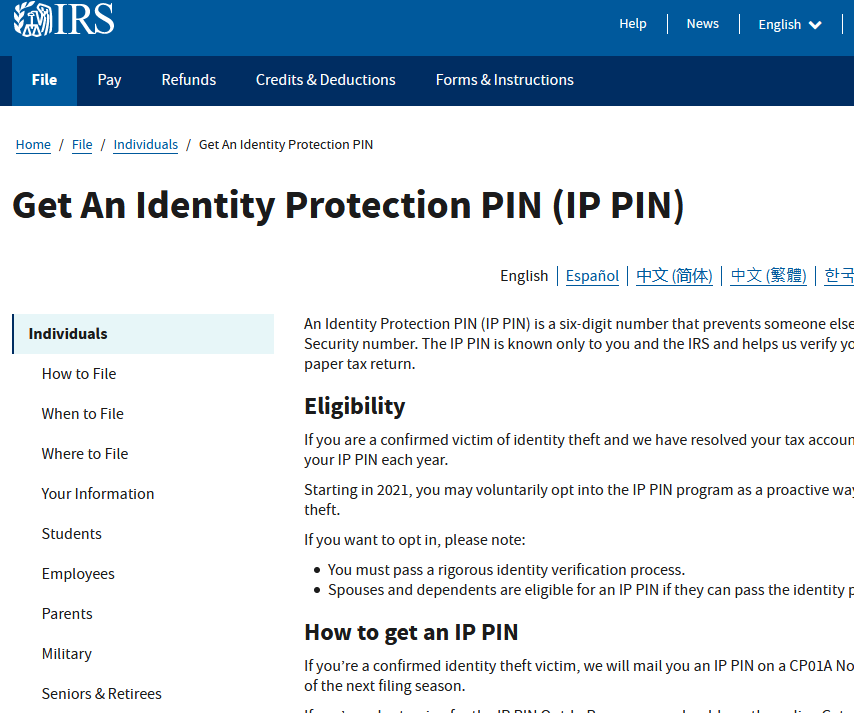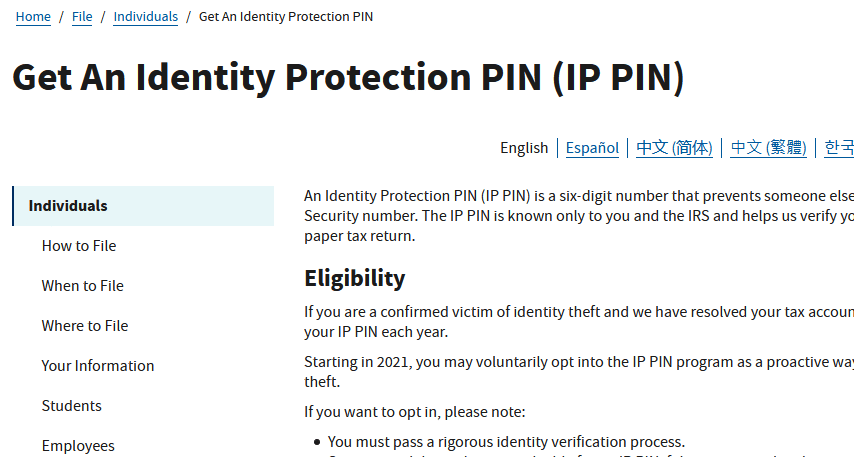Introduction
If you haven’t already secured your IP PIN IRS, now’s the time to act. In 2025, the threat of tax‑related identity theft is more intense than ever, and the IRS’s identity‑protection tool known as the IP PIN IRS is your front‑line defence. At Syed Professional Services we understand the complexities of taxes, accounting and immigration — and we strongly urge you to make use of the IP PIN IRS program so you don’t get caught off‑guard. In this post we’ll show you 9 compelling reasons why the IP PIN IRS isn’t just a nice‑to‑have, but a must in 2025.
What is the IP PIN IRS and How It Works
The term IP PIN IRS stands for Identity Protection Personal Identification Number issued by the Internal Revenue Service (IRS). It’s a six‑digit code assigned to you that helps prevent someone else from filing a tax return using your Social Security number (SSN) or Individual Taxpayer Identification Number (ITIN).
The IP PIN IRS works like this: when you file your federal individual income tax return (such as Form 1040), you enter the number. The IRS then matches the number against its record. If the number is missing or incorrect, the return may be rejected or delayed.
This extra layer of authentication makes it significantly harder for fraudsters to file a bogus return in your name. Only you and the IRS know the IP PIN IRS, so if someone tries to file using your SSN without having the correct code, the return will not pass the IRS’s screening.

In short: the IP PIN IRS is a powerful tool—especially for taxpayers who want to safeguard their tax identity.
Why You Absolutely Need an IP PIN IRS in 2025
Escalating threat of tax identity fraud
Tax‑time threats are increasing. Fraudsters are more sophisticated, and the IRS has flagged many cases where someone else filed fraudulent returns in another person’s name. The IP PIN IRS is one of the most effective defences against that.
IRS policy updates and enhanced protections
For 2025, the IRS has emphasised the importance of the IP PIN IRS program. For example, one of its 2025 tax‑tips stressed that the IP PIN IRS is “a vital tool to protect taxpayers from fraudsters”.
Also, as of 2025 there are new e‑filing rules: if a dependent has already been claimed on someone else’s return, the second filer may need an IP PIN IRS to e‑file successfully. (Without one, the return may get rejected.)
Peace of mind and proactive protection
Even if you’ve never been a victim of identity theft, opting in for the IP PIN IRS means you’re staying ahead of the curve. It’s much better to assume vulnerability and adopt the extra safeguard than wait for a problem to appear.
Better refund processing and fewer hurdles
If you have an IP PIN IRS and file correctly, you reduce the risk of your return being flagged for identity theft or duplicate SSN use. That can speed up your refund, reduce headaches and avoid costly delays.
Protecting dependents and family members
The program isn’t just for you — dependents can be covered too. If someone claims your child as a dependent fraudulently, your IP PIN IRS helps prevent such misuse. That means family‑wide protection.
International & non‑resident applicability
Even if you are abroad, or you live outside the U.S., the IP PIN IRS is still relevant. The IRS states that anyone with an SSN or ITIN, including those living abroad, is eligible.
Enrolment is voluntary — you choose control
While the IP PIN IRS program is voluntary, that’s exactly the point: you choose to strengthen your tax‑security posture. The choice is yours, but the benefits are tangible.
Consistent renewal and yearly protection
Each IP PIN IRS is valid for a calendar year and you’ll receive a new one annually. That means your protection is ongoing, not just a one‑time fix.
Cost‑effective for your peace of mind
There’s no extra fee from the IRS to enrol in the IP PIN IRS program — you’re simply leveraging a free resource. Given the potential cost of identity theft, it’s a bargain.
How to Apply for Your IP PIN IRS
Eligibility requirements and the application journey
To apply for the IP PIN IRS, you must have a valid SSN or ITIN and verify your identity. According to the IRS, anyone with an SSN or ITIN — including those living abroad — can apply. IRS
If you already have an online account with the IRS at IRS.gov, the fastest route is via the “Get an Identity Protection PIN” tool.
If you cannot verify online, alternatives include submitting Form 15227 (for lower‑income individuals) or visiting a taxpayer assistance centre in person.
Step‑by‑step to enrol
-
Go to the IRS website and sign into your online account or create one.
-
Navigate to the IP PIN section and choose either a one‑year or continuous‑enrolment option.
-
If eligible, your IP PIN IRS is immediately available in your profile.
-
If you used an alternative method, you’ll receive the IP PIN IRS by mail in a few weeks.
-
Once you have your code, be sure to file your tax return with it — enter the six‑digit IP PIN IRS exactly as issued.
Key points to remember
-
The IP PIN IRS is only valid for the year in which it’s issued. Don’t reuse last year’s code.
-
Only you and the IRS should know your IP PIN IRS — beware of scams. The IRS will never email, call or text you asking for your IP PIN IRS.
-
Once enrolled, you must use the IP PIN IRS for all federal tax returns (including amended returns) filed that year.
-
If you lose or forget your IP PIN IRS, you can retrieve it via your online account or call the IRS.
Common Issues and Solutions with IP PIN IRS
Lost, misplaced or forgotten IP PIN IRS
If you misplace your IP PIN IRS, don’t panic — you can get it back. Via your IRS online account, you can retrieve the code quickly. If you cannot access online services, call the IRS at 800‑908‑4490.
However, until you enter the correct IP PIN IRS, your e‑file may be rejected or your paper return delayed. That makes retrieval urgent.
Dealing with rejections, delays and filing mishaps
One of the common pitfalls: filing a tax return without the correct IP PIN IRS. The result? The IRS may reject the e‑file or delay processing the paper return.
Another issue in 2025: if you claim a dependent who’s already been claimed by someone else, and you lack an IP-PIN IRS, your return may be rejected.
Opting out or changing your status
If you enrolled for a one‑time IP PIN IRS, you won’t automatically be enrolled next year — you’d need to request again. If you’re in continuous enrolment, you’ll receive a new code each year automatically.
If you believe you no longer need participation (rare, but possible), you may choose to exit the programme — but doing so may expose your tax identity to higher risk.
Expert Tips to Maximize Your Security with IP-PIN IRS
Best practices for managing and storing your IP-PIN IRS
-
Store your IP-PIN IRS in a secure location (preferably with your tax records) and do not share it casually.
-
Only disclose your IP-PIN IRS to your tax preparer when necessary — never via unsolicited email or phone call.
-
Use strong online account credentials for IRS.gov (multi‑factor authentication if available) because your IP-PIN IRS application starts there.
-
Renew or retrieve your IP-PIN IRS early in the tax‑season so you’re ready when filing begins.
Integrating the IP-PIN IRS with broader tax‑identity protection
-
Use the IP-PIN IRS and monitor your credit reports (for fraudulent open accounts) and IRS account transcripts for unusual activity.
-
If you’re an immigrant, non‑resident, or expatriate, make sure you remain eligible and maintain your SSN or ITIN status while using the IP-PIN IRS.
-
Consult your accountant or tax advisor — at Syed Professional Services we help clients integrate IP-PIN IRS enrolment into overall tax‑risk strategies, especially for cross‑border or immigration‑linked filings.
-
Update your tax software and filing procedures to include the IP-PIN IRS entry step so you don’t miss it accidentally.
What to do if you suspect identity theft even with an IP-PIN IRS
Even with an IP-PIN IRS, you should stay vigilant. If you receive an IRS notice about duplicate filings, or suspect someone misused your SSN, contact the IRS Identity Theft Protection line and consider filing Form 14039. The IP-PIN IRS will help, but may not alone solve broader identity‑fraud issues.
FAQs
What exactly is an IP-PIN IRS?
An IP-PIN IRS is a six‑digit number issued by the IRS to eligible taxpayers to prevent someone else from filing a tax return with their SSN or ITIN.
Who is eligible for the IP-PIN IRS?
Anyone with a valid SSN or ITIN who can verify their identity. This includes U.S. residents, absentees, and dependents (in some cases).
Does everyone have to get an IP-PIN IRS?
No. The program is voluntary, but highly recommended in 2025 due to increased tax‑fraud risks.
How often do I need a new IP-PIN IRS?
Each code is valid for one calendar year. If you enrol for continuous participation, you’ll get a new one each year.
What happens if I file without the correct IP-PIN IRS?
Your e‑file may be rejected or your paper return delayed until the IRS verifies your identity.
Can I share my IP-PIN IRS with my tax preparer?
Yes — but only your trusted tax preparer, and only when preparing your return. The IRS will never call, email or text you asking for your IP-PIN IRS. If someone asks, it’s a scam.
Conclusion
In the world of tax filings, the IP-PIN IRS stands out as a smart, proactive protection tool. Especially in 2025, with evolving threats and new IRS policies, not having an IP-PIN IRS is a risk you don’t want to take. At Syed Professional Services, we specialise in helping clients navigate tax, accounting and immigration challenges — and incorporating the IP-PIN IRS into your annual tax routine is a key step toward securing your financial wellbeing.
Don’t wait for someone else to file a fraudulent return in your name. Get ahead, enrol your IP-PIN IRS, protect your identity, and file confidently this year and beyond.




